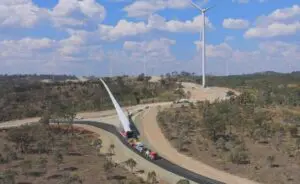An Australian invented technique for coating aircraft and ships with patterns inspired by nature – such as the surface of shark skin – could be the key to achieving massive improvements in fuel efficiency and big cuts to global transport emissions.
According to the inventors of the coating innovation, fuel savings of as much as 10 per cent could be achieved for aircraft and heavy ships by mimicking the properties of surfaces found in nature, effectively making the vehicles more slippery.
The innovation has been made possible through the development of a new 3-D printing technique, developed by the Sydney-based technology company MicroTau, which says its ‘Direct Contactless Microfabrication’ process – that it has been developing for the last six years – is able to reproduce the properties of materials found on the surfaces of plants and animals.
MicroTau has produced a film coating inspired by the properties of shark skin that can significantly reduce the drag of aircraft surfaces and improve energy efficiency. The company estimates that by adding the coating to planes and ships, it could improve fuel efficiency by as much as 10 per cent.
With the air travel sector spending around $260 billion on fuel in the years prior to the Covid-19 pandemic, applying the coating to aircraft could deliver significant reductions in both fuel costs and greenhouse gas emissions.
The innovative coating can be retrofitted to aircraft during routine maintenance, and MicroTau’s ability to iterate the design of the coating structures allows the technique to achieve rapid improvements in performance.
Adopting a coating inspired by shark skin has famously been applied to swimsuit design that helped cut the drag on Olympic swimmers who went on to post significantly faster times in competition. MicroTau’s technology could allow the same concept to be applied to large ships and aircraft.
The Clean Energy Finance Corporation has made a $2 million investment in MicroTau to support its commercialisation. The company estimates that if the film is applied across commercial aviation and shipping industries, it could achieve as much as $34 billion in fuel savings and a 225 million tonne reduction in carbon dioxide emissions each year.
“This is an exciting development from an Australian company that is leading the market in its innovation,” CEFC CEO Ian Learmonth said.
“The MicroTau technology has the potential to be a cost effective, scalable solution that can be retrofitted to existing transport to help minimise the carbon footprint of major transport industries.”
“MicroTau’s unique technology offers a potential competitive advantage due to its lightweight and ease of application. This is a genuine breakthrough solution to a longstanding technical challenge in aviation. With application across aviation and shipping, the technology has the potential to play a practical role in addressing the major challenges in mass transport in a globalised world.”
The CEFC’s investment was part of a $5.6 million seed investment round for MicroTau. CEO Henry Bilinski said wide-scale adoption of the film coating could help reduce the climate impact of international freight and transport industries.
“Aviation and shipping have a burning fuel problem that’s only getting worse. Over millions of years nature has developed solutions to improve efficiency, and now – with the backing of the CEFC – MicroTau will put shark skin inspired film on planes to help fight climate change,” Bilinski said.
The technology had already attracted the interest of major manufacturers in the defence industries, with the Direct Contactless Microfabrication technique securing the backing of the US Air Force after being pitched as a way of improving fuel efficiency as part of a global innovation competition.









